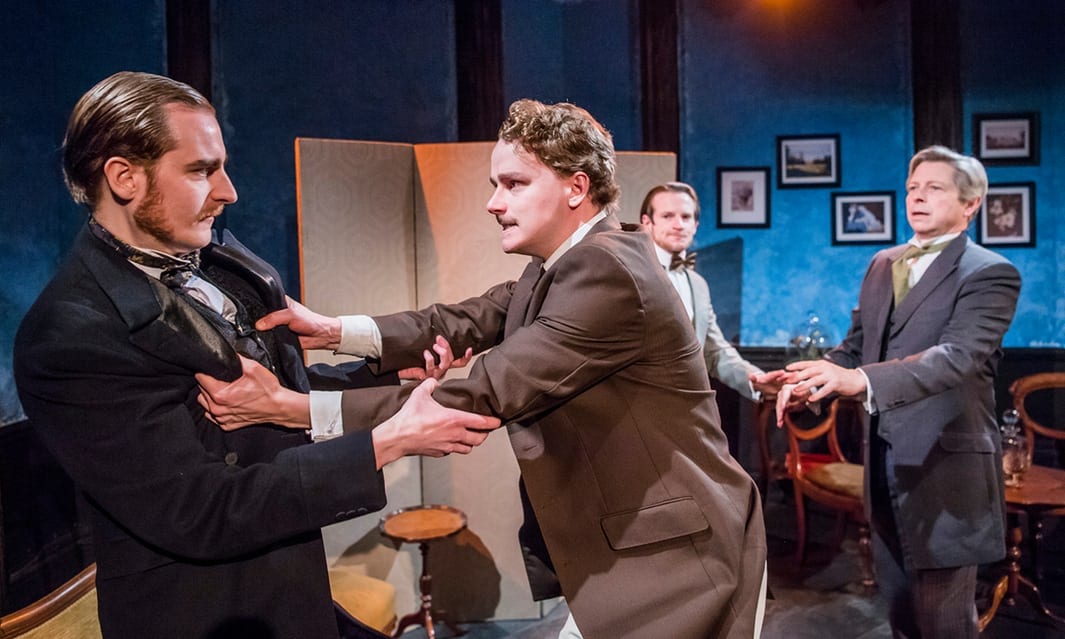This production of Cyril’s Success is the first in London since 1890. This is not a famous play, but it certainly has some good qualities in terms of the script’s wit and sophisticated expression; Hannah Boland Moore, the director, has made a great decision in bringing it back to the stage after its long absence.
The set is a modestly furnished Victorian sitting room, which doubles as rooms in two different homes. One room is in the home of Cyril Cuthbert (Tim Gibson) and his wife (Isabella Marshall), the other room belongs to the widower Mrs Bliss (Allegra Marland). Cyril is a wildly successful novelist with a doting partner by his side, but his brash indifference to the delicacy of Mrs Cuthbert’s feelings threatens to completely dismantle their domestic life. There is a comedy of errors over misattributed letters about infatuation, leading Mrs Cuthbert to abandon her cage and seek refuge with her independent and world-weary ex-teacher Miss Grannet (Susan Tracey).
The charm of this play lies in its quips and deft comic exchanges. For instance, when Mr Pincher (Stephen Rashbrook) brings a vitriolic magazine to Cyril and his friend Titeboy (Lewis Hart) brings a laudatory one, both discussing the merits and demerits of Cyril’s latest novel, the pair act out a battle of these critics with a tormented Cyril caught in the crossfire. Mr Pincher, presented by Rashbrook as an unshakable intelligent man, often provides clever ripostes to people with whom he talks, yet the women of the play can often topple his confidence – Mrs Cuthbert slyly refers to him as a beast when he insults a painting she has hung, much to the bemusement of Titeboy. Lewis Hart excels in his performance as Titeboy with rage-fuelled asides about his perceived inferiority in comparison to certain taller bachelors with military careers.
The play shows how concerns for reputation can be ridiculously narcissistic. Cyril, who does indeed enjoy his series of literary successes, lets it all go to his head when he neglects to attend to the feelings his wife. Tim Gibson portrays Cyril as a cavalier fellow, who is surrounded by his coterie and oblivious to any shady intentions of Major Treherne (Will Kelly). Isabella Marshall does very well at showing the multiple facets of her character: benevolent when she welcomes guests into her home, irascible when Cyril is distracted and frenzied when she suspects Mrs Bliss of cajoling her husband into having an affair.
The second half of the play is not as strong as the first. The characters seem mellowed, more willing to forgive other’s transgressions, when what made them so entertaining before was their scorn and fierce desires to prevail in independence. For instance, the socially mobile Miss Grannet reunites with her husband, whom she was comfortably separated from for 22 years, over simply cooking some loin chops together. Mrs Cuthbert, wanting to cure her husband’s depression and alleviate his decline in writing prowess, longs to return home to care for Cyril. Recent critical denigration is a barometer for Cyril’s self-esteem: he gulps down brandy and complains about his dirty house in his dressing gown. It’s a shame that the denouement of the play involves calming reconciliations and a return to conjugal affection, but we are a long way off from Nora’s door slam in Ibsen’s A Doll’s House.
In the end Cyril and Mrs Cuthbert joyously smile in one another’s arms, as she is once again subservient to his needs and a catalyst for his success, just as the po-faced Mr Pincher succumbs to milky sentimentality and joins back up with Miss Grannet; Treherne is now a hopeful penitent following a near-death experience. Unfortunately, the wild directions of independent characters are wrenched back into the straight and narrow of social order, which I suppose is for the sake of the comedy in its avoidance of radical themes that would upset fragile contemporary sensibilities. Apart from bone-picking about the plot, I find that the play is an interesting lost curio of the Victorian age, with excellent comic writing that showcases Byron’s brilliant eloquence.

